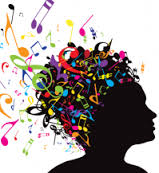The season is changing and finals are approaching.You know what that means, the library and every study hall will be full of students with their nose in a book. Spending countless hours attempting to retain academic literature they most likely would not remember two weeks after their exam. But yet, every lyric to a new song on the radio is remember from years on in. As I listen to music and write this post I ask myself. Why, is it that the things we are taught in a college lecture more difficult to remember than “I know when that hotline bling” lyrics to songs?
Music is an art of expression, using vocals and instruments to form a harmony which then evokes emotion and memories. PhD, music professor, current musician Jonathan Berger and his colleagues at Stanford University School of Medicine conducted a research showing how music correlates to cognitive ability. The researchers focused on the areas of the brain in which cognitive abilities such as human retention, human projection and memory event improvement occur.

The professors coordinated a research using an fMRI (functional magnetic resonance image) taking images of the brain while the brain was listening to music to see which areas of the brain would be active. They noticed that in order for the brain to understand a continuous flow, it extracts information into sections from beginnings, endings, and the in-betweens of an event. They then called this form of operation “event segmentation”. The purpose of this observational study was to analyze which parts of the brain are affected when listening to music. It specifically showed the correlation of music and how it enhances the brains ability to predict events and retain attention. In the brain memory has three storage systems. Each system serves a different purpose. From this foundational study, the functional magnetic resonance image scan showed the brain progressing, responding to different harmonies and phases. Brief breaks in tempos followed by new beats activates the first network called the ventral fronto-temporal network. The dorsal fronto-parietal network, the second network, turns the spotlight of attention to the change and, upon the next event beginning, updates working memory.
(Clip of how cognitive activity increases during the transition breaks as music is played.)
How the brain creates memory
Encoding is an important factor in retaining memory. Encoding is a process in which perception through the senses is used to construct an idea that can be stored in the brain. When an event catches our attention, the neurons in our brain activate, storing a short-term memory of the event. Now, once multiple senses are involved such as touch, scent, and in this case listening, it increases the chances of the event “sticking” and being stored in or long-term memory bank.
For an example, emotion, when emotions are evoked in a person their attention increases. Have you ever noticed when you have a crush on someone you remember everything about them, their scent, laugh and a whole bunch of other things you would have never noticed on someone you see everyday like your professor? Our brain uses multiple networks to store and retrieve information. The same thing happens when you listen to music. When listening to music our brain has multiple influences to help us remember the song like rhythm, lyrics, just like with your crush and their favorite perfume or cologne. Memory retrieval requires revisiting the neuron pathways the brain processed in order to encode the memory. Therefore it is easy to remember lyrics in a song because music evokes emotion which links it to related memories.

Repetition
When listening to a song we have multiple perceptions (the rhythm, tones, and lyrics) that influence how we remember what we heard. A specific beat, instrument, or adlib helps us remember the lyrics to a song because of the rhyme and pattern. For an example, the tune “dun dun dun dun” automatically translates to the lyrics “here comes the bride”,for people who heard the song before of course. Why is that? The beat often coincides with the lyric, making it easier to eliminate words that do not continuously flow (syllable) with the beat. Making it often easier to predict the lyrics to a song if you remember the tone. The art of repetition is important when trying to retain information and songs naturally repeat themselves.
In this experiment, an experiment was conducted. The experiment showed how a new song words were retained faster than a college students studies.
I am a huge procrastinator because I learned long ago “cramming” is how I retain information. Until I noticed I wasn’t retaining the information but instead I would just memorize the material. I thought it was because I would listen to music instead of paying attention. After researching this topic, I concluded that music isn’t the issue, it’s the resolution and I should try turning my notes into a song.
